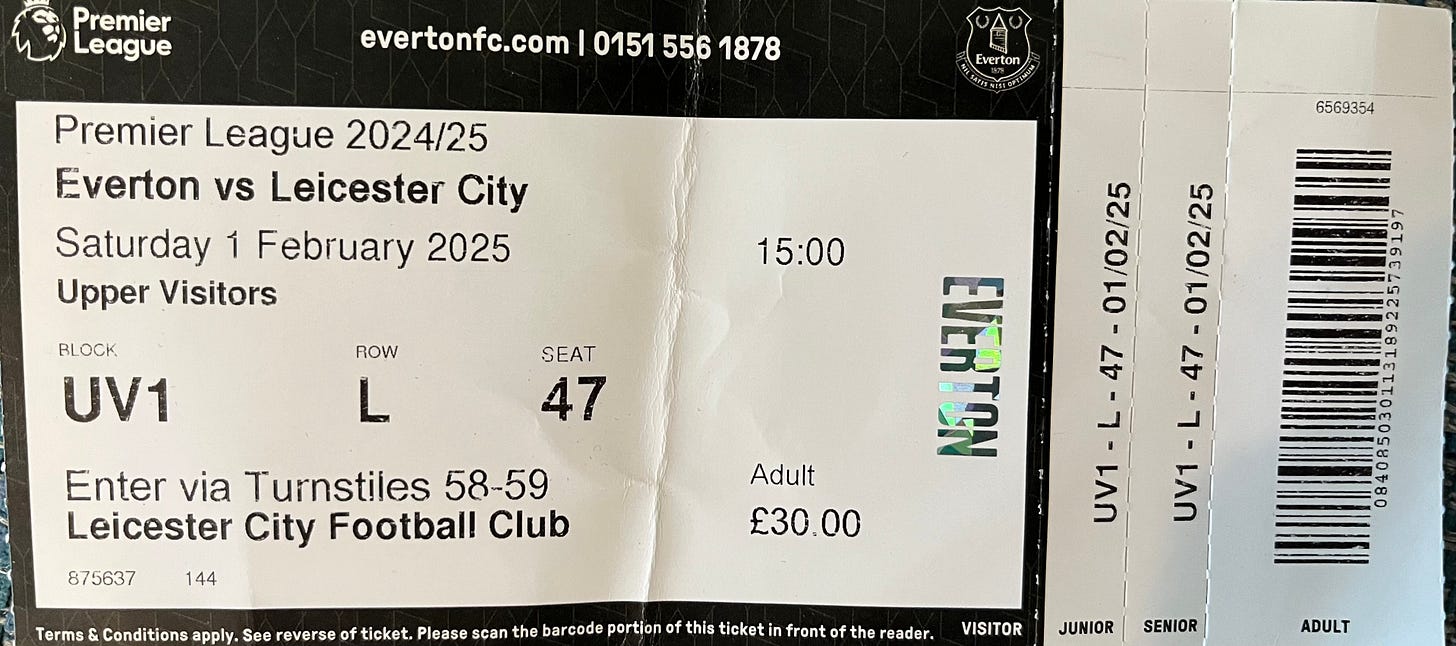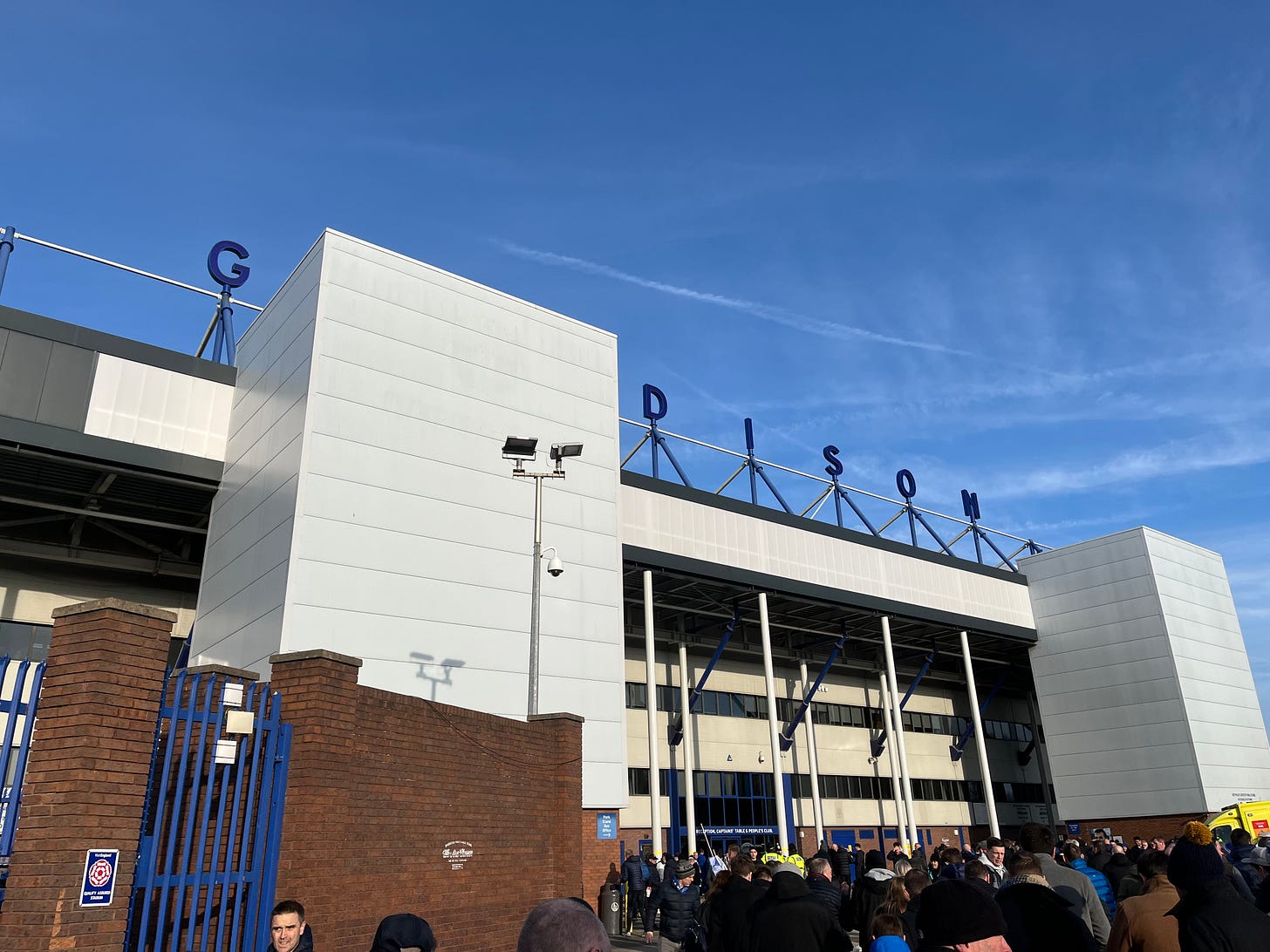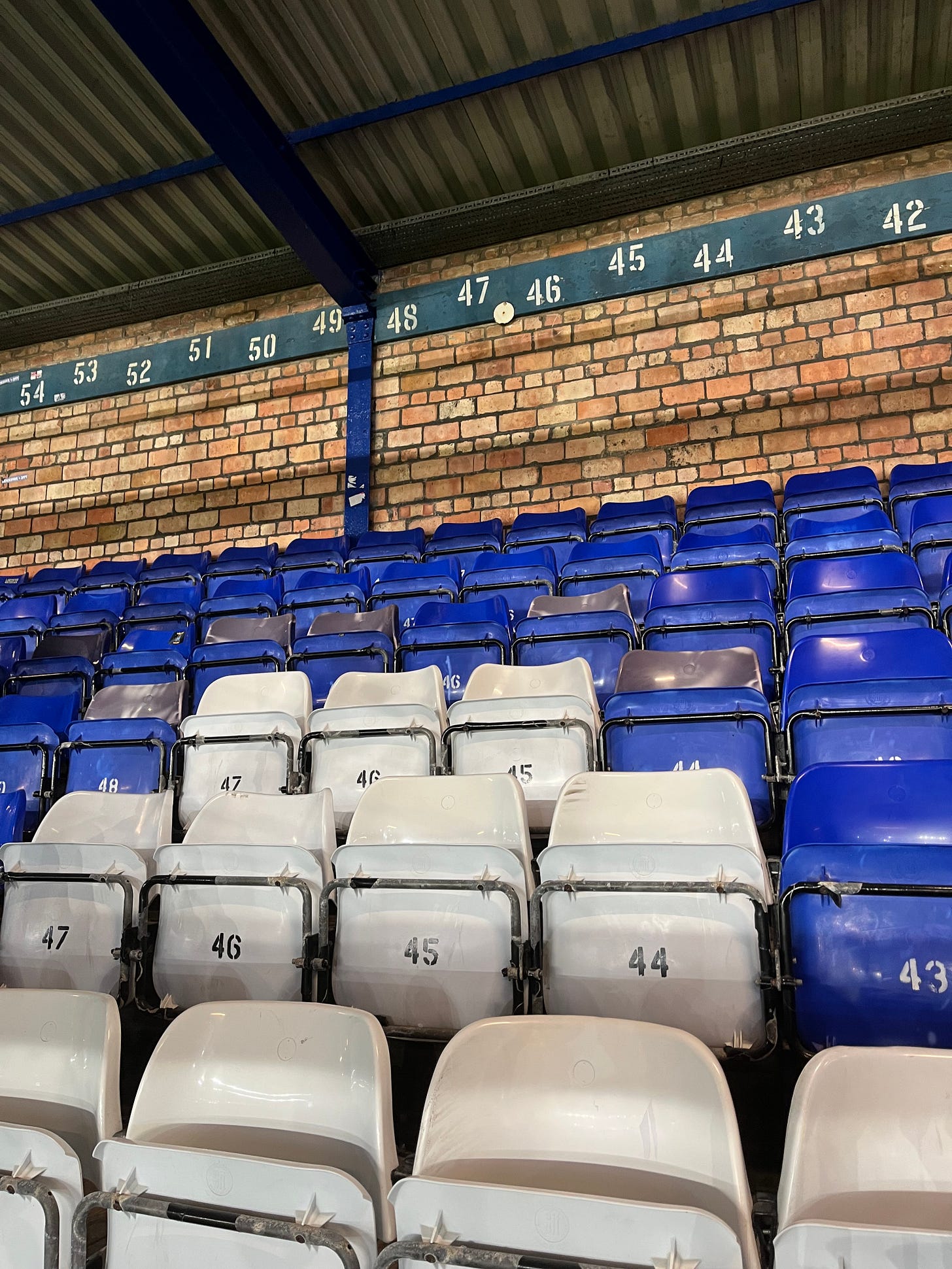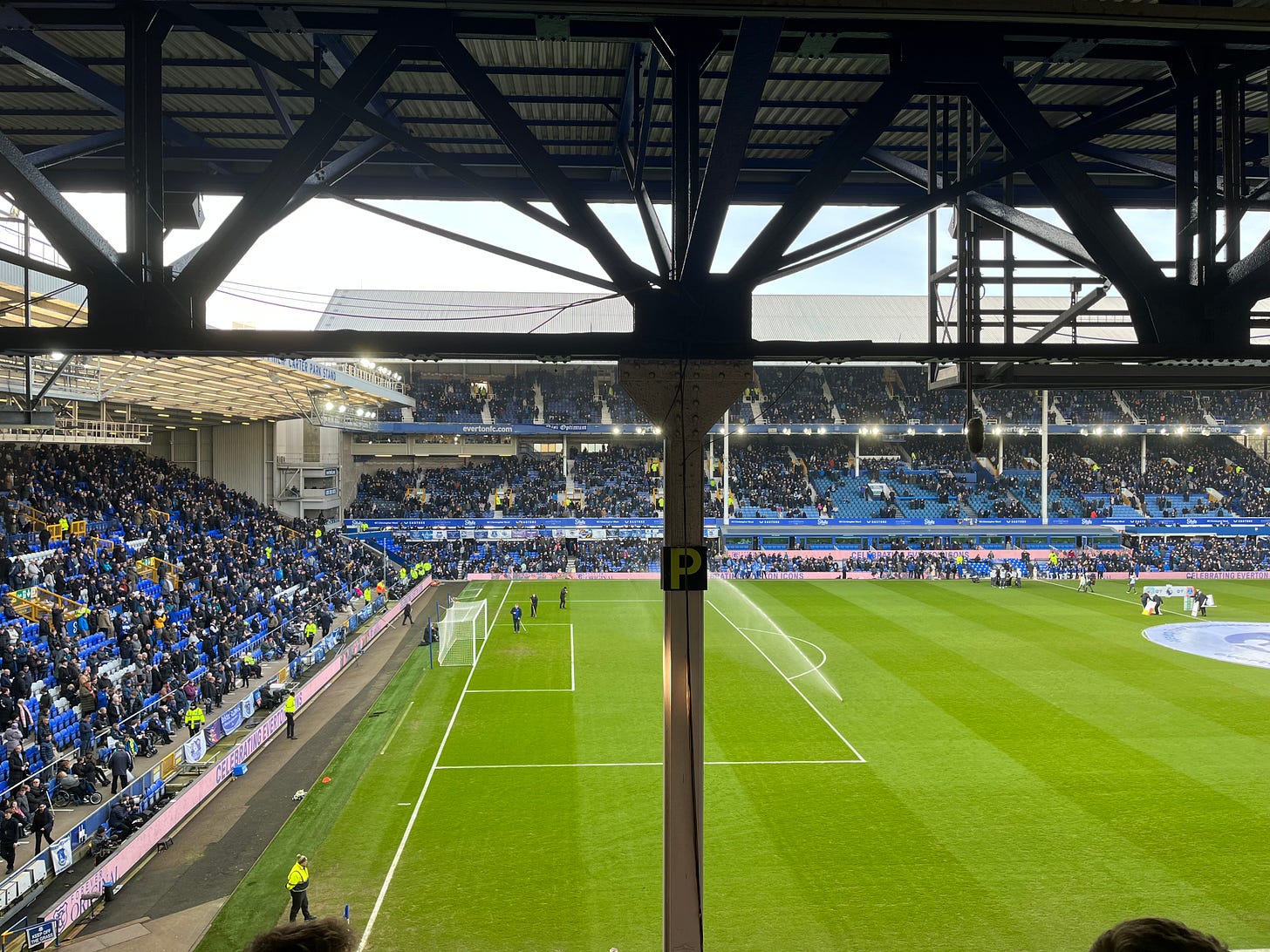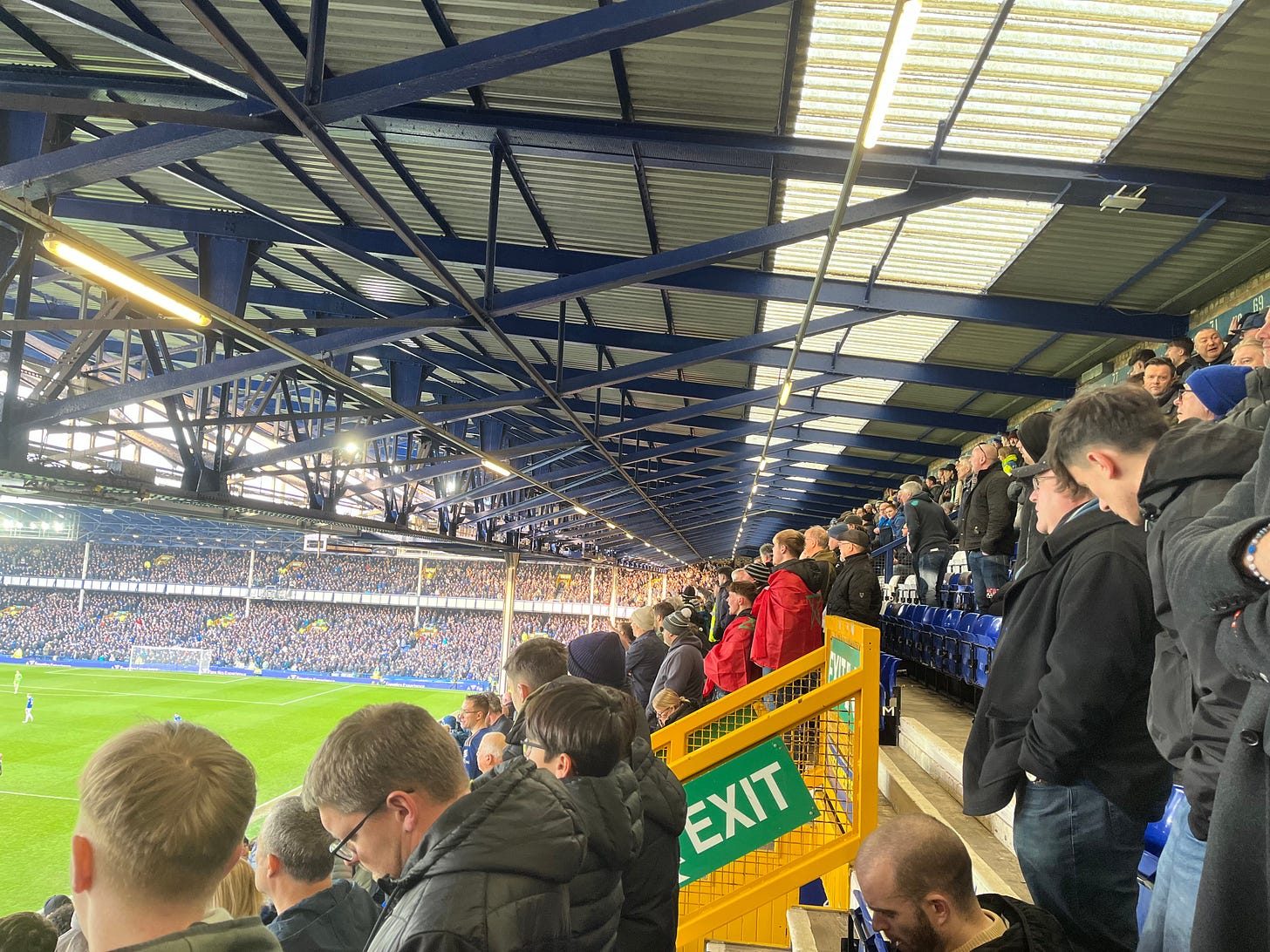Regular readers will know that my football writing on this Substack is mostly aimed at trying to understand this strange interest of mine: why do I (and thousands of others) keep going to games even when the football is bad, and indeed take pride in that? - you can’t have street-cred as a real fan unless you’ve known football suffering, and there’s little worse than a fan who only takes an interest when things are going well, the proverbial ‘glory-hunter’. But of all aspects of fandom, the most inexplicable is surely going to away games, typically involving hours of tedious travel to watch a match that your team is, on average, more likely to lose.
I try and get to one away game a season. I’ve now been to 14 different grounds following Leicester in the league (a couple more than once), but I’ve only seen four away wins1. A Leicester fan does not set off for an away game with high expectations. And so it was when I decided to go to yesterday’s match at Goodison Park, which has been Everton’s home for over 132 years, and was the world's first purpose-built football stadium; but yesterday was Leicester’s last match there2, as the old place is shortly to be demolished: Everton moves next season to a new, more glamorous home two miles to the west.
Goodison is a piece of English football history, so I wanted to be able to say I’d been there before the bulldozers move in. When I booked my ticket a few weeks ago, Everton were struggling badly in the league, but since then they have reappointed David Moyes, who made his name there during an 11-year stint from the early 2000s, and he has reminded them how to win. Even though we somehow won at Spurs last week, I didn’t take much confidence from that result given the difficulties they’re also having at the moment.
I guessed that most of the people waiting at Nuneaton station, where I caught my late-morning train to Liverpool, were probably football fans: mostly young and middle-aged men, and part of a Saturday ritual which sees thousands of people travel sometimes great distances across the country during the football season, criss-crossing like armies of ants to take their places in the nation’s away stands: by coach, car or train, it is an alcohol-fuelled ritual that some people join every other week, gaining a distinctive perspective on England’s geography, a particular knowledge of certain motorway service stations and railway routes. The level of dedication involved is remarkable.
Even though England has a much stronger away-fan culture than many footballing countries, there are still typically no more than about 3,000 away fans at any Premier League game - fewer in the smaller stadiums - so it is a particularly devoted as well as more vocal minority that goes away. Coming back yesterday evening I changed at Crewe, where a group of loud, well-oiled Leicester fans were trooping round the station trying to find our platform, and singing loudly: this aspect of fan culture can seem quite aggressive, and I suspect it feels threatening to people who are not used to it (though real trouble is very rare now). Sometimes I wish some of my fellow fans would just shut up and be more considerate though.
Taking a direct train to Liverpool in the morning meant getting there earlier than I would have chosen to, especially as the 11.05 was almost on time. It was sunny - the clouds ended at the Mersey, and the city sky was bright and clear. I decided to go and look at the new stadium, at Bramley-Moore Dock on the Mersey, not far south of where the river meets the Irish Sea. It was about 1½ miles’ walk from the station, past derelict brick warehouses; the shiny new building, with a capacity of well over 50,000, looks impressive in the way many modern stadiums do. Sadly I don’t think we will be playing there next season.
I then walked back into the city centre to catch up with a couple of friends from Foxes Pride for a drink, and then we got a bus the couple of miles up to Goodison. It is one of those old-fashioned stadiums that is closely surrounded by terraced houses, as if it’s squeezed itself into a space that’s almost too small for it, so there are some houses only a few metres from the high walls of the stands. Unlike the smooth lines of its successor down the road, Goodison has evolved and grown messily over well over a century, finding ways to adapt and make the most of its constrained surroundings - its four stands were all built at different times in different styles. Home and away fans mingled in the streets round the stadium without any difficulties - these two clubs don’t have any particular history3.
We were searched and made our way through old-fashioned, shabby metal turnstiles (with modern scanners) and upstairs through the narrow crowded bar area to our seats. As always in an away end, everyone stands for the game; it’s not strictly allowed, and occasionally I’ve been at matches where stewards have half-heartedly tried to get people to sit down, but mostly they don’t bother; and of course anyone who did sit would be unable to see over the heads and hats of those in front.
The Bullens Road Stand, built almost 100 years ago, has an old-school feel, with its corrugated roof, brick walls, wooden floors and stencilled numbers, and the sightlines are poor - we struggled to see the nearside corner of the far end of the pitch. The view is also famously restricted by supports holding up the stadium roof: when you book tickets some seats are labelled as ‘restricted view’ - those are the ones where the pillar impedes the view of the goal; the rest of us each had a particular slice of pitch that we couldn’t see.
The game was absolutely terrible. We conceded a goal within about ten seconds, as their hardly-potent attack cut through our defence like a knife through water. They scored a near-identical second goal only a few minutes later, and we were 3-0 down by half time. The only thing to be said for the second half was that we managed to avoid conceding again until right at the end, following some comic capers on the edge of the far penalty area. I never expected we would win, but remained grimly hopeful for a while that we might at least get a consolation goal from somewhere, but that possibility had evaporated long before the end. The stats say that we had nine shots, one on target, but it didn’t feel like that many.
The away fans were angry from the start (even in the bar before the game), at the director of football and the Board, and as the game progressed were increasingly cross at the players too (who mostly seemed to me devoid of ideas and confidence rather than uncommitted - the performance felt error-strewn, even though our pass completion rate was no worse than theirs). Some players got particular abuse, notably the never-popular Wout Faes and midfielder Harry Winks (who was so good for us last season). Our front three had a combined age of 103, and while no one would dare mock the venerable Jamie Vardy, there was a brief rendition of ‘if you’re faster than Ayew clap your hands’. I did not hear so much ire directed at the manager - Ruud van Nistelrooy was a risky appointment which isn’t paying off, and I think many fans have sympathy for the position he finds himself in, and feel he’s out of his depth; though there was bewilderment that after such a poor first half he didn’t make any substitutions at half time4.
The chanting - fruity (I’ve sanitised here) but mostly not offensive - cycled between anger (‘sack the Board’ and ‘you’re not fit to wear the shirt’), gallows humour, the standard Leicester chants (the Vichai song got one outing), and the usual attempts to taunt the home fans (‘is this is a library?’, ‘2-0 up and you still don’t sing’), particularly during the second half when many of the away end seemed - understandably - to have lost interest in whatever was happening on the pitch. In the first half we put on blue-tinted spectacles and ran through some of the old favourites from the songbook, chants for former players such as Lloyd Dyer, Andy King, Leo Ulloa and Esteban Cambiasso, as well as ‘there’s only one’ Nigel Pearson, who remains a favourite among parts of the fanbase almost ten years after he was sacked as manager.
When Vardy was substituted and the home fans sang ‘Jamie Vardy, your wife is a ——’, our reflex response was the usual ‘Jamie Vardy, he’s won more than you’, which, even if you squint hard, is not remotely true; there will have been plenty among the home fans who still remember Everton’s glory days of the mid-1980s when they won the league title twice (Gary Lineker moved there from Leicester and played at Goodison for a season), let alone the FA Cup win in 1995. So we reverted to ‘thirty years and you’ve won nothing’, which put us on stronger ground.
A witty chant can be one of the joys of football, but the humour took a while to develop. 2-0 down after six minutes and we couldn’t manage anything better than ‘this is embarrassing’, and - pre-empting anticipated taunts from the home fans - ‘we are going down’ (which sat somewhat uncomfortably with ‘we always back the lads’). Then things got going, and we had the self-deprecatory, ‘how bad must you be, it’s only 2-0’. Although we actually had more of the possession during the match - we just didn’t do anything with it, beyond inviting them to counterattack - by the second half any successful pass was being cheered: ‘we won the ball! we’ve got the ball!’
When Patson Daka had our one shot on target, caught comfortably by Jordan Pickford, the away section cheered mockingly as if we’d scored, and sang the goal song - with all hope drained away, we had to give ourselves something to enjoy, and make a point. And best of all was the chorus of ‘we want restricted view’ to the tune of La donna è mobile from Verdi’s Rigoletto, which made me smile wanly. It was that sort of afternoon.
At the final whistle there were loud and inevitable boos from the away section - though many had left in disgust by that point - and while some of the Leicester players came over to sheepishly applaud us, the least they could do, it was not appreciated. This club is not in a good place, and relegation feels almost inevitable - we are once more in the relegation zone after Wolves’ win over Villa. I am feeling quite sanguine - rebuilding in the Championship (and goodness knows there is much rebuilding to do) will be less painful than hanging onto Premier League status by our chewed fingernails. There are still plenty of financial chickens to come home to roost next season, but one way or another we’ll still be playing football, and singing, good or bad.
As I walked past the emptying seats, a police officer was good-naturedly taking a photo of a couple of fans, somehow smiling, but surely wanting to remember the ground rather than the performance5. We walked down the shabby steps into the early evening outside, trying to ignore the home glee. The moon’s narrow, wonky smile looked down on us pitifully from the clear sky as we headed back to the station to make our way home. That was eleven hours of my life I will never get back, all for ninety minutes of predictably dire football. But I’ll do it again next season, wherever we are.
At Brighton and Chelsea in 2018, Sheffield Utd in 2019 and Watford in 2022.
In theory we could still go there in the FA Cup, but that would have to involve us beating Manchester Utd at Old Trafford on Friday, so it feels unlikely.
Apparently there has been a higher proportion of Premier League draws in this fixture than any other played regularly, whatever that means.
During which members of Everton in the Community comprehensively failed in the crossbar challenge.
The screens in the ground at one point told us there are nine more games there - the next league game is the Liverpool derby, which will be a rather tougher test for Moyes’s men.




